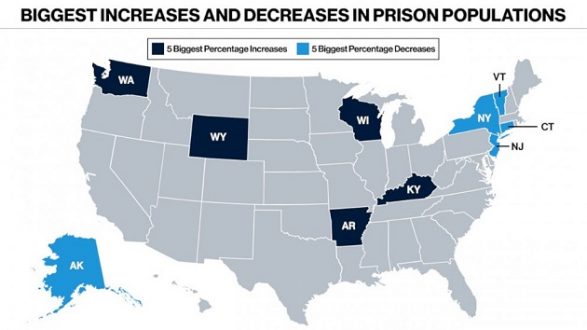
 ABC News, The Sentencing Project(NEW YORK) — The renewed interest in criminal justice reform is having an impact in a real way, experts say.
ABC News, The Sentencing Project(NEW YORK) — The renewed interest in criminal justice reform is having an impact in a real way, experts say.
A recent report shows that 39 states had decreases in their prison populations from 2009 to 2017, but there is still concern that those overhauls can be undone quickly.
In addition to the decreases in 39 states, the federal government’s prison population also decreased by 7.3% since its peak in 2009.
Nazgol Ghandnoosh, a senior research analyst and author of the report released by the nonprofit The Sentencing Project, told ABC News that while the sheer number of states effectively making reforms stands out as a positive takeaway, “the bad news” is that the rate of reform isn’t as significant as she believes it needs to be to counteract the decades of policies that led to the states’ respective highest points.
“The overall impact of the reforms that they’ve implemented has been so modest,” Ghandnoosh said, pointing to the 7.3% decrease on the federal level.
“This pace of decarceration can’t possibly undo the pace at which we created mass incarceration in the 40-year period before that,” she said.
The prison population grew by 700% from 1972 to 2009, according to the report.
The states with the highest percentage decrease of their prison populations were Alaska, New Jersey, Vermont, Connecticut and New York, respectively, ranging from 38.9% to 32.2% decreases.
The report is based off the latest federal data from the Bureau of Justice Statistics. However, since the most recent data is from 2017, the author noted that some of the states with the biggest decreases have since reversed course based on newer information ascertained at the state level.
For instance, Alaska is the state listed as having achieved the biggest decrease in their prison population, dropping 38.9% since they had their peak prison population in 2006. But, in the past two years, state lawmakers have repealed laws that experts say helped contribute to that decrease, the report says.
The report also notes that Alabama, a state where prisons are under intense scrutiny amid abuse accusations, had a 24.5% decrease in population since their peak in 2012. But monthly reports released by the state show that they had a 4% increase from September 2018 to June 2019.
Charlotte Morrison, a senior attorney at the nonprofit Equal Justice Initiative, pointed to “de-politicizing decisions around mass incarceration” as a factor.
“Where that effort has been successful, states have made a lot of progress,” Morrison said.
“The fact that it wasn’t making the public safer and that it is so expensive has brought people together to work on ways to demarcate and reform criminal justice policy,” Morrison said, adding that “where that effort has been successful, states have made a lot of progress.”
However, just as those issues were depoliticized, the pendulum can swing back the other way, and has in some instances, like in Alaska and Alabama. The report cites Alaska’s Senate Bill 91, passed in 2016, which toughened penalties for major crimes and softened them for minor ones.
“A lot of the progress in recent years were undone by political decisions in those states,” Morrison said.
The 11 states that saw increases in their populations all shared another factor in common: the peak year of their prison populations was in 2017. The data in the report suggests that as more time elapsed since a state’s peak prison population, more reforms took place. For instance, among the top 10 states with the biggest decreases, their peak prison populations occurred between 1999 and 2012.
Those states with increases in their prison populations are largely in the south or west, including Arkansas, which had a 23.4% increase in their prison population from 2012 to 2017, Tennessee, Kentucky, Wyoming, Nevada, South Dakota, New Mexico and Washington. Midwestern states, like Missouri, Kansas and Wisconsin, were also among those with increased prison populations.
Copyright © 2019, ABC Radio. All rights reserved.










